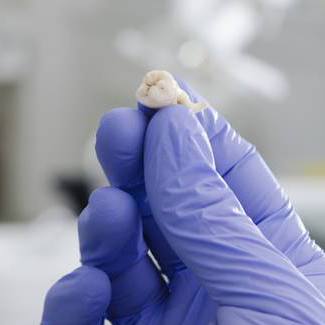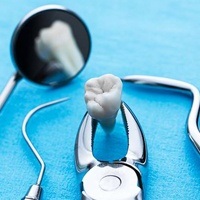Tooth Extractions – Parker North, CO
Tooth Extractions Provide Pain Relief and Protect Oral Health

As an experienced restorative dentist, Dr. Rodney Allen always seeks to help his patients preserve their complete smile for a lifetime. However, it is sometimes necessary to remove one or more teeth to protect a patient’s oral health and overall well-being. Why might you need to undergo a tooth extraction, and what can you expect during the procedure? Read on to discover the answers to these important questions.
Reasons for Tooth Extractions

There are a number of reasons why you may need to have one or more teeth extracted:
- A tooth is suffering from a severe infection.
- A tooth is so badly broken that a restoration, such as a crown, would not be able to adequately restore its strength and function.
- There is overcrowding in the mouth, and it is necessary to remove a tooth in order to make room for orthodontic treatment.
- The third molars, otherwise known as the wisdom teeth, are posing a threat to your oral health, or you wish to get them removed as a precautionary measure.
Dr. Allen will only recommend a tooth extraction if he truly believes it is the best course of action. Often, alternative treatments (such as root canal therapy) are able to save a suffering tooth. If it is necessary to remove a tooth, you may later be able to replace it with a fixed bridge or dental implant.
The Tooth Extraction Process

There are two types of tooth extractions:
A simple extraction is used for teeth that have fully erupted from the gum line. During the procedure, Dr. Allen numbs the tooth and the area around it. Then, he gently applies force to break the ligaments that attach the tooth to the jawbone. Once the ligaments are broken, he pulls the tooth out of the mouth.
A surgical or complex extraction is used for teeth that have not fully erupted from the gum line, as is often the case with wisdom teeth. Local anesthesia, along with sedation, will help you relax throughout the procedure; you should not feel any significant discomfort. Dr. Allen creates an incision in the gums to reveal the tooth, then extracts it with as little impact to the surrounding tissue as possible. Sometimes, he must break a tooth into pieces in order to facilitate removal.
Recovering from a Tooth Extraction

The soft tissue at a tooth extraction site heals fairly quickly; much of the swelling and soreness should go away within a few days to a week. You can avoid complications by eating soft foods, not smoking, and not using straws for a few days after the procedure. If you have any questions or concerns during your recovery period, reach out to our team so we can give you the expert guidance you need to have a smooth journey back to a healthy smile.
Do you believe you may need a tooth extraction? Contact our dental office to ask questions about this procedure or to schedule an appointment with Dr. Allen.
Understanding the Cost of Tooth Extractions

Upon being told that they need a tooth extraction, many patients find themselves wondering, “Will I be able to afford the procedure?” It should be noted that there is no universal price for the extraction process; different patients can expect to end up paying different amounts. For this reason, an important part of your initial consultation for a tooth extraction will be a discussion of the costs involved as well as what payment options are available.
Factors That Can Affect Tooth Extraction Cost

The details of the tooth extraction process can vary from patient to patient. As such, there are a number of factors that can end up influencing the overall cost of the treatment; here are just a few examples:
- Some extractions involve more teeth than others. If you’re only having one tooth removed, you can expect to pay less than a patient who needs to have two or more teeth taken out.
- Back teeth tend to cost more to extract than front teeth. This is due to the fact that extractions involving the back teeth tend to be more complex.
- Fully erupted teeth can normally be removed with a simple extraction. Meanwhile, partially or fully impacted teeth may require a surgical extraction, which often costs more.
- In addition to the price of the tooth extraction itself, you will also need to think about how much you will need to pay to have a bridge, denture, or dental implant placed in order to fill the gap in your smile.
Does Dental Insurance Cover Tooth Extractions?

Oftentimes, having a reliable dental insurance plan can go a long way toward making it easier to pay for tooth extractions. You should double-check your plan to confirm what coverage is available, but generally speaking, many insurance companies will pay part of the cost of a tooth extraction as long as the procedure is considered necessary for protecting your oral health.
Many dental insurance plans will pay around 50% of the cost of tooth extractions and other major dental procedures. You may need to pay an annual deductible before your coverage kicks in. Also, if you just switched to a new plan, there may be a waiting period before your insurance company is willing to pay for certain procedures. Our team can review your dental insurance plan with you and make sure that you fully understand your benefits.
How to Make Tooth Extractions Affordable

If you feel like it would be easier to break up the cost of your tooth extraction, you may want to consider applying for CareCredit. You will be given the option of signing up for a payment plan that is suitable for your budget, allowing you to pay for your care in a number of installments spread out over several months. If you would like more details about CareCredit and how it works at our office, please give us a call.
Tooth Extraction FAQs
Can I Leave the Empty Space After a Tooth Extraction?
Every tooth is important for a healthy, beautiful smile. Except for wisdom teeth or those removed for orthodontics, it's best to have your tooth replaced. Your adjacent teeth won't have sufficient support, which will cause them to shift over time. As they move from position, you'll have an increased risk of cavities, gum disease, and tooth loss. Dr. Allen will review your replacement options at your consultation, like a dental implant or bridge.
Can I Smoke After Getting a Tooth Removed?
Smoking can increase your risk of complications after an extraction because it affects your body's ability to heal and fight infections. Tobacco can delay healing and cause dry socket, a painful condition that occurs when the blood clot at the extraction site is lost too soon. It's best to avoid smoking for at least 5 days after your tooth is removed. Ideally, you shouldn't smoke for 2 weeks to allow your mouth to heal.
Does Getting a Tooth Extracted Hurt?
Your dentist will keep your comfort a priority. A local numbing agent or a sedative will be used to block any pain. You may feel pressure, but you won't have any outright pain. Although you won't feel anything during the procedure, you can expect your mouth to be sore for a few days after the effects of any sedatives or anesthetics dissipate. You can manage it with a prescribed or OTC pain reliever. Apply a cold compress to reduce pain, inflammation, and bruising. Eat soft foods until any tenderness improves. If your pain suddenly worsens or doesn't get better, contact our office right away.
What’s the Difference Between Tooth Extraction and Wisdom Tooth Removal?
Wisdom tooth removal can be more invasive than a standard tooth extraction. Wisdom teeth can be partially or fully hidden below the gum tissue. As a result, an incision is needed to expose the tooth before it can be taken out. Most other teeth require a simple extraction using forceps. Recovering from a simple extraction is often shorter than with surgical removal because it's less invasive. Dr. Allen will examine your mouth to determine which procedure will be necessary.

